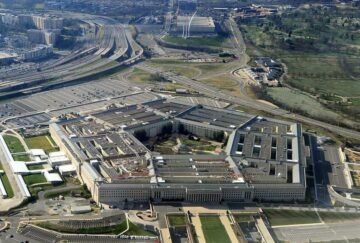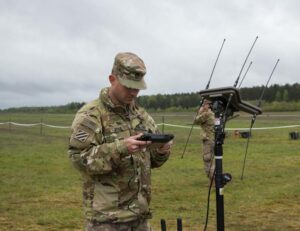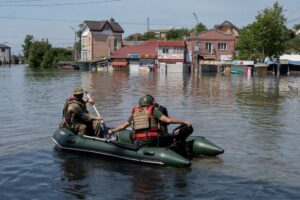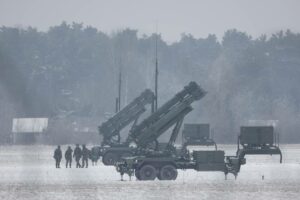
There is a push by leaders in Washington and Beijing to get U.S.-China relations back on track. U.S. Secretary of State Antony Blinken met with President Xi Jinping in China in June 2023 to reopen the lines of communication between the countries. And Treasury Secretary Janet Yellen is spending four days in China, which began July 6, 2023, to try to stabilize U.S.-China economic ties.
But work to steady security issues between the two countries, a longtime point of contention, may have a longer horizon.
In fact, the U.S. military’s decision to shoot down a suspected Chinese spy balloon that had been flying over the country in February 2023 derailed the scheduled diplomatic trip Blinken planned for China earlier in the year.
Now there are news reports that China made deals with Cuba to set up an electronic eavesdropping station on the island nation, just 90 miles from Florida — something Cuban government officials have denied – and to build a military training facility there. Such moves reflect efforts by China to grow its influence in Latin America and the Caribbean.
A Biden administration official in June said China’s spying from Cuba is an ongoing issue that predates the president’s time in office and that U.S. intelligence knew China had upgraded existing espionage facilities in Cuba in 2019.
As a researcher of China-Latin America relations and a former U.S. government official, I have seen firsthand China’s growing influence in Latin America and the Caribbean, and am concerned about its far-reaching implications for U.S. national security.
China’s planned spy base and military training facility in Cuba would be located near the U.S. naval station in Guantanamo Bay, home to several U.S. military facilities like U.S. Southern Command in Miami and U.S. Central Command and U.S. Special Operations Command both in Tampa, along with their various component commands.
The facility would allow Chinese intelligence officers to better intercept sensitive military information transmitted between U.S. military commands, track senior U.S. diplomatic and military leaders as they travel across the region, monitor U.S. naval and commercial ship movement, and gain details about U.S. military exercises, conferences and training with various Latin American and Caribbean countries.
The facility could also bolster China’s use of telecommunications networks to spy on U.S. citizens.
U.S. officials have long suspected Chinese telecommunications companies Huawei and ZTE of setting up servers and network equipment around the world, including in Cuba, to help the Chinese government collect sensitive information about local government leaders and private citizens.
Chinese companies such as China Harbour Engineering Co. have constructed dozens of deep-water port projects in Latin American and Caribbean countries, where Chinese intelligence agencies could track U.S. commercial or naval ship movements around important sea lanes like the Panama Canal, which could help China understand where to restrict U.S. maritime routes during a potential military conflict.
Chinese companies have also either built or operate 12 space research facilities in South America that can be used for legitimate space research. But U.S. and other officials have voiced concern that these same sites could be used to spy on U.S. satellites and intercept sensitive information.
Chinese police forces are a growing presence as well. In April 2023, the FBI arrested two Chinese citizens for allegedly operating an illegal police station in New York City’s Chinatown. According to The New York Times, the men allegedly harassed Chinese dissidents living in the U.S.
China allegedly operates 100 of these police outposts around the world. Fourteen of them are in eight Latin American and Caribbean countries.
China has also been stepping up its law enforcement engagement in Latin American and the Caribbean, donating anti-bullet vests, helmets and vehicles to local security forces, and Latin American and Caribbean law enforcement officers have gone to China to receive training.
Chinese technology companies Huawei, ZTE, Dahua and Hikvision have donated surveillance cameras and facial recognition technology to city governments in Argentina, Brazil, Bolivia, Ecuador, Guyana and Suriname.
While these Chinese companies deploy these technologies to help Latin American and Caribbean governments reduce crime, they could also use them to spy on U.S. government personnel living in these countries. In fact, the U.S. has banned some of these companies out of concern they spy for the Chinese government.
China’s participation in law enforcement activities in these countries erodes the U.S. position as the region’s preferred security partner.
Meanwhile, a major source of conflict between the U.S. and China is the supply of the drug fentanyl. In April 2023, the Biden administration declared fentanyl an emerging threat to U.S. national security. The fentanyl global supply chain often ends on U.S. streets, but it begins in various pharmaceutical company labs in China.
The U.S. Treasury and Justice departments have sanctioned or charged several Chinese companies and individuals for knowingly selling fentanyl precursors to Mexican cartel operatives, who then produce the deadly fentanyl and sell it to Americans.
The China-Cuba connection is just one example of how the Chinese government and Chinese companies have been expanding their influence on America’s doorstep for decades — not just through trade and investment, but also through espionage, military and law enforcement activities. Such activities will greatly affect U.S. national security for years to come.
This article is republished from The Conversation. Click here to read the original article.
Leland Lazarus is the associate director of national security at the Florida International University. Lazarus is also a term member of the Council on Foreign Relations, a nonresident fellow at the Atlantic Council’s Global China Hub, and a board member of the Fulbright Association.
- SEO Powered Content & PR Distribution. Get Amplified Today.
- PlatoData.Network Vertical Generative Ai. Empower Yourself. Access Here.
- PlatoAiStream. Web3 Intelligence. Knowledge Amplified. Access Here.
- PlatoESG. Automotive / EVs, Carbon, CleanTech, Energy, Environment, Solar, Waste Management. Access Here.
- BlockOffsets. Modernizing Environmental Offset Ownership. Access Here.
- Source: https://www.defensenews.com/opinion/commentary/2023/07/07/chinas-ties-to-cuba-growing-presence-in-latin-america-raise-concerns/
- :has
- :is
- :not
- :where
- $UP
- 12
- 2019
- 2023
- 70
- 90
- a
- About
- According
- across
- activities
- administration
- affect
- agencies
- allegedly
- allow
- along
- also
- am
- america
- American
- Americans
- an
- and
- Antony Blinken
- April
- ARE
- Argentina
- around
- arrested
- article
- AS
- Associate
- Association
- At
- back
- back on track
- banned
- base
- Bay
- BE
- been
- began
- Beijing
- Better
- between
- biden
- Biden Administration
- board
- board member
- bolster
- both
- Brazil
- build
- but
- by
- cameras
- CAN
- Caribbean
- central
- chain
- charged
- China
- Chinas
- chinese
- Chinese intelligence officers
- Citizens
- City
- CNN
- CO
- collect
- come
- commercial
- Communication
- Companies
- company
- component
- Concern
- concerned
- Concerns
- conferences
- conflict
- connection
- Conversation
- could
- Council
- countries
- country
- Crime
- Cuba
- cuban
- Days
- Deals
- decades
- decision
- departments
- deploy
- details
- Director
- donating
- down
- dozens
- drug
- during
- Earlier
- Economic
- Ecuador
- either
- Electronic
- emerging
- ends
- enforcement
- engagement
- Engineering
- equipment
- espionage
- example
- existing
- expanding
- facial
- facial recognition
- Facial Recognition Technology
- facilities
- Facility
- fact
- far-reaching
- fbi
- February
- fellow
- florida
- flying
- For
- Forces
- foreign
- Former
- four
- from
- Gain
- get
- Global
- gone
- Government
- Government Leaders
- Government Officials
- Governments
- greatly
- Grow
- Growing
- had
- Have
- Helmets
- help
- Home
- horizon
- How
- HTML
- HTTPS
- Huawei
- Hub
- i
- Illegal
- images
- implications
- important
- in
- Including
- individuals
- influence
- information
- Intelligence
- International
- investment
- island
- issue
- issues
- IT
- ITS
- Jinping
- jpg
- July
- june
- just
- just one
- Justice
- Labs
- Latin
- latin america
- Latin American
- Law
- law enforcement
- Lazarus
- leaders
- legitimate
- like
- lines
- living
- local
- Local Government
- located
- Long
- longer
- made
- major
- Maritime
- May..
- member
- Men
- met
- Miami
- Military
- Monitor
- movement
- movements
- moves
- nation
- National
- national security
- Near
- network
- networks
- New
- New York
- New York Times
- of
- Office
- officers
- official
- officials
- often
- on
- ONE
- ongoing
- operate
- operates
- operating
- Operations
- or
- original
- Other
- out
- over
- Panama
- participation
- partner
- Personnel
- Pharmaceutical
- planned
- plato
- Plato Data Intelligence
- PlatoData
- Point
- Police
- position
- potential
- preferred
- presence
- president
- private
- produce
- projects
- Push
- raise
- Read
- receive
- recognition
- reduce
- reflect
- region
- relations
- reopen
- research
- researcher
- restrict
- routes
- s
- Said
- same
- Sanctioned
- satellites
- scheduled
- SEA
- secretary
- security
- seen
- sell
- Selling
- senior
- sensitive
- set
- setting
- several
- Sites
- some
- something
- Source
- South
- South America
- Southern
- Space
- special
- Spending
- spying
- stabilize
- State
- station
- steady
- stepping
- such
- supply
- supply chain
- surveillance
- suspected
- Technologies
- Technology
- technology companies
- telecommunications
- term
- that
- The
- The New York Times
- the world
- their
- Them
- then
- There.
- These
- they
- threat
- Through
- Ties
- time
- times
- to
- track
- trade
- Training
- travel
- treasury
- treasury secretary
- trip
- try
- two
- u.s.
- U.S. government
- U.S. Treasury
- understand
- university
- upgraded
- use
- used
- various
- Vehicles
- washington
- WELL
- which
- WHO
- will
- with
- Work
- world
- would
- WSJ
- xi
- xi jinping
- year
- years
- yellen
- york
- zephyrnet












